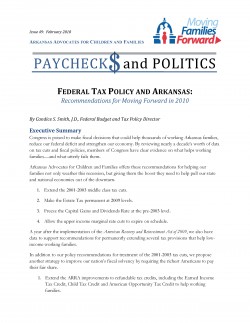
Congress could make pivotal tax policy decisions this year that will affect our fiscal outlook, government policies, and shape our economy for decades. Virtually all of the tax cuts enacted in 2001 and 2003 expire at the end of this year. Members of Congress and the President have already signaled that some of the tax cuts should be extended, which would require legislative action. While it isn’t yet clear how Congress will proceed, both revenue and spending policies must be evaluated now to determine what is working and what should expire. Our Congressional delegation should make a priority of putting the country back on a sustainable fiscal path and ensuring that resources are available for sound investments that are in the best interests of Arkansas families.
One of the main arguments for enacting the tax cuts was they would spur robust economic expansion. Instead the country experienced lackluster economic growth even before the current economic downturn. The median income of American house holds was stagnant and the income gap between rich and poor was exacerbated . At the same time, the country’s fiscal outlook weakened significantly; the surpluses projected at the end of the 1990s were replaced with ongoing and unsustainable deficits.
As members of Congress consider budget-related policies, such as extending the expiring tax cuts this year they should distinguish between the short- and long-term implications of their decisions on the federal budget. The current economic downturn and responses to it have resulted in historically high federal deficits. Most mainstream economists agree that stimulating the economy by replacing demand with an infusion of federal dollars during a recession, particularly one as widespread as the recent downturn, is warranted on a short-term basis. The greater concern is that the federal deficit, though projected to decline as the economy improves, is not expected to fall to a sustainable level even after the economy is in recovery. If allowed to continue to increase , the debt is projected to grow at such a rate that interest payments will exceed all funding available for non-security discretionary spending within a decade.
Maintaining responsible and adequate revenue is an important part of this discussion. This paper focuses on tax policy choices in the context of our difficult long-term fiscal situation. After reviewing current projections of deficits and the debt, and how federal tax dollars are spent, we focus on the 2001 -2003 tax cuts. We conclude by reviewing the implications of key policy choices facing Congress and make recommendations for fiscally responsible choices that will lead to shared prosperity in Arkansas and across the country.
There are a number of policy and political factors that will influence Congressional budget and tax decisions. It ’s imperative that Congress make fiscally responsible decisions that don’t saddle our children and future generations with even more debt. Congress should also consider well-targeted policies for both our families and small businesses. These decisions will be difficult, but rarely are policy decisions so critical to the economic well-being of our country.
